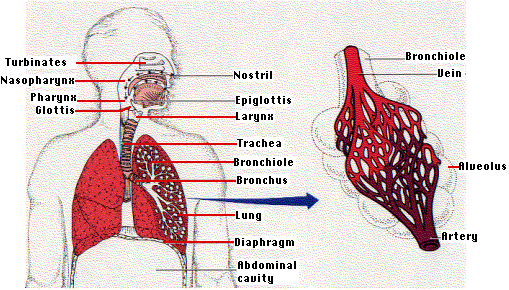Respiratory failure - acute/chronic - symptoms and treatment

Respiratory failure - The inability of the LUNGS to diffuse enough oxygen into the bloodstream to meet the body’s needs. Respiratory failure may arise from end-stage pulmonary disease, extensive trauma, severe CARDIOVASCULAR DISEASE (CVD) or crisis (such as HEART ATTACK), neurologic damage or injury (such as SPINAL CORD INJURY, TRAUMATIC BRAIN INJURY [TBI], STROKE, or neurodegenerative disorder), or severe INFECTION (sepsis). Respiratory failure may be acute or chronic.
Acute Respiratory Failure
Acute respiratory failure is a life-threatening condition that results from the inability to breathe enough or the inability of the lungs to diffuse adequate amounts of oxygen into the blood, or a combination of both.
Symptoms of acute respiratory failure typically are pronounced and include
- extreme DYSPNEA (shortness of breath or difficult BREATHING)
- CYANOSIS (bluish hue to the lips and SKIN)
- HYPOTENSION (low BLOOD PRESSURE)
- cardiovascular SHOCK
Treatment of Acute Respiratory Failure
Treatment of acute respiratory failure requires oxygen administration and immediate resuscitative breathing or MECHANICAL VENTILATION; without prompt restoration of oxygenation, death is inevitable.
Chronic Respiratory Failure
Chronic respiratory failure may also be lifethreatening, though commonly the person accommodates the inadequate oxygenation through restricted physical activity and treatments such as OXYGEN THERAPY. Chronic respiratory failure is a consequence of progressive pulmonary disorders such as CHRONIC OBSTRUCTIVE PULMONARY DISEASE (COPD).
Symptoms of chronic respiratory failure may be activity related and often include
- persistent COUGH
- dyspnea, especially with exertion
- diminished cognitive ability or confusion
- cyanosis
- fatigue
- edema (swelling, typically in the hands and feet)
Treatment of Chronic Respiratory Failure
Doctors measure and assess chronic respiratory failure through blood levels of oxygen (which are low) and carbon dioxide (which are high). People who have chronic respiratory failure also commonly have PULMONARY HYPERTENSION. Treatment for chronic respiratory failure attempts to improve oxygenation through OXYGEN THERAPY and medications such as bronchodilators and some situations corticosteroids. The underlying disease and the person’s response to therapy are key factors in determining the overall treatment approach. When chronic respiratory failure results from endstage pulmonary disease, treatment options are limited. Some people are candidates for LUNG TRANSPLANTATION.
See also APNEA; ATELECTASIS; BREATH SOUNDS; BRONCHIECTASIS; OXYGEN-CARBON DIOXIDE EXCHANGE; SUDDEN CARDIAC DEATH.